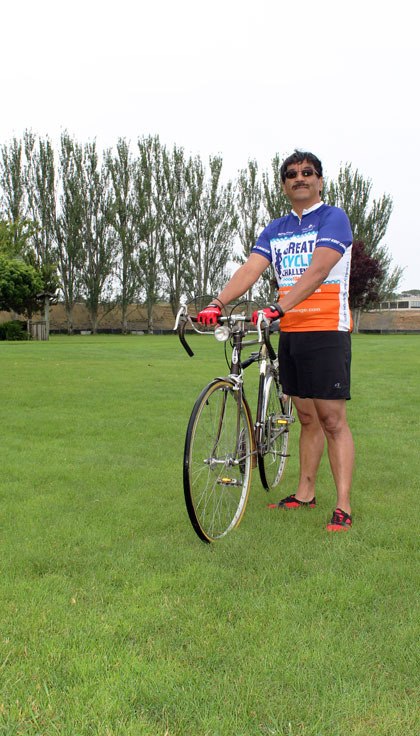When Ernie Branigh heard the diagnosis, he was devastated.
It was prostate cancer, the second leading cause of death for men in the United States, a disease anticipated to cause about 26,120 mortalities in 2016 alone.
“I felt that life as it was, that was it for me,” Branigh said.
Prostate cancer was a factor in his own father’s demise and, as a widower, Branigh was afraid he would leave his two sons without a parent.
Branigh’s cancer was diagnosed in the semi-early stages, he said, “about halfway there” before the disease most likely would have progressed extensively, greatly decreasing his chances of survival.
According to the Prostate Cancer Foundation, prostate cancer is the most common non-skin cancer in America, affecting 1 in 7 men. The organization website also states that men are 35 percent more likely to be diagnosed with prostate cancer than women are to be diagnosed with breast cancer.
In many ways, that experience 10 years ago altered Branigh’s perception, and has given him motivation to do more to help in the fight against cancer.
“It caused me to be more observant about my health, and people around me,” he said.
“It could happen to anybody.”
The Oak Harbor resident retired from the Navy 20 years ago and devotes much of his time to volunteer work, including participating in efforts with the North Whidbey Lions Club, as well as the annual nationwide Great Cycle Challenge USA.
The challenge, in which riders pledge to ride a certain amount of miles and receive donations from family, friends and community members, is a fundraising effort to benefit the Children’s Cancer Research Fund.
“Most participants have not been affected by cancer, but are just very generous people who are grateful for their health and have the ability to give back,” Jim Leighton, vice president of events, Children’s Cancer Research Fund, wrote in an email.
Leighton added that about 600 of the nearly 27,000 participants in this year’s event are from Washington state.
It’s Branigh’s second year riding for the challenge, which takes place throughout the month of June.
According to his rider profile, Branigh has raised $528.88 thus far. He said he has pledged to ride 1,000 miles.
Last year, he cycled 1,200 miles and raised $1,655. He said he’s chosen a somewhat lighter goal this year as he was feeling a bit under the weather. Nonetheless, he still cycles daily and tracks his progress on the site.
His personal experiences with cancer, as well as his experience encountering child cancer patients in the military, contributed to his wish to participate.
While in the Navy, Branigh said he witnessed that in some countries, including Korea, Thailand and India, many children with cancer were placed in orphanages because there were insufficient medical facilities or resources to treat them.
“They put them there to live out their life.”
According to the American Cancer Society, or ACS, the most common cancers in children are leukemia, brain and other central nervous system tumors, neuroblastoma, Wilms’ tumor (also known as nephroblastoma), Hodgkin and non-Hodgkin lymphoma, rhabdomyosarcoma, retinoblastoma and bone cancer.
The organization website states that childhood cancer rates have been increasing over the past few decades, with an estimated 10,380 children in the United States under the age of 15 expected to be diagnosed with cancer in 2016.
According to the Great Cycle Challenge website, more than 15,700 children are diagnosed with cancer each year, and 38 die each week.
Branigh noted that cancer is “a silent killer” both physically and emotionally. He said cancer patients are often afraid to talk about it, or unsure of who to confide in.
“They sometimes suffer in silence,” he said, adding that this is particularly true of children, who depend on their parents or guardians to protect them.
“It’s a real shock to them knowing that they have cancer,” he said. “If we can support them, and let them know there are people out there that will help them and guide them through their treatment and what they’re going through, it will make a better day for them.”
To donate or learn more about the challenge, visit https://greatcyclechallenge.com/Riders/ErnieBranigh



